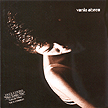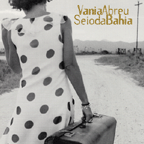
Mercury served a brief stint in this pop band, after working as a singer for Gilberto Gil's group. She quickly moved into her solo career, but provides vocals on this album.


Daniela Mercury is one of the most popular modern Brazilian artists, a champion of the swinging Bahian axe style, which mixes Afro-Brazilian samba with rock, pop, reggae, soul and Caribbean influences. Throughout the 1990s, Mercury was the style's superstar, a dynamic interpreter of this new dance music. Her sister, Vania Abreu, is also worth checking out.
Companhia Clic "Companhia Clic" (Eldorado, 1990)

Mercury served a brief stint in this pop band, after working as a singer for Gilberto Gil's group. She quickly moved into her solo career, but provides vocals on this album.
Daniela Mercury "Daniela Mercury" (Celluloid, 1991)


Although this starts off on a promising note ("Swing da Cor", an upbeat track with a heavy dose of afro bloco percussion), it quickly gallops off into tepid Madonna/Flash Dance flavored pop, and then into Michael Bolton-ish quiet storm balladry. Dated, a bit thin-sounding, and plagued by tacky synthesizers. Mercury's work seems to follow in the footsteps of Margareth Menezes's axe-reggae, but with a much stronger AOR pop orientation. "Menino Do Pelo" and "Maravilhe" are the other listenable tracks on here. Also released as Swing Da Cor.
 Daniela Mercury "O Canto Da Cidade" (Sony, 1993)
Daniela Mercury "O Canto Da Cidade" (Sony, 1993)


Daniela Mercury "Musica De Rua" (Epic-Brasil, 1994)


One of Brazil's most popular young pop musicians of the 1990s, Mercury has skillful phrasing and a great voice (which is not unlike Gal Costa's), although her talents are sometimes obscured by overly slick pop arrangements. This album was produced by Liminha, who guided Gilberto Gil through many of his worst albums in the 1980s; although nothing on here is all that disastrous, this is just slightly too glossy for my tastes. Axe street rhythms are mixed in with a general pop vibe. Worth checking out if you want to keep up on recent pop stars, but it left me a little flat.
 Daniela Mercury "Feijao Com Arroz" (Sony Latin, 1997)
Daniela Mercury "Feijao Com Arroz" (Sony Latin, 1997)


Probably her best-produced album to date, this avoids the clunkier moments of earlier efforts. Although it glides lightly into overly-glossy pop-soul territory, on the whole it's listenable, which some interesting pan-cultural combinations (such as the pife flutes in the slick soul tune, "Feijado de Corda" (which also features Tony Mola & Bragada on percussion). Parts of some tracks are overtly irritating (Gypsy Kings-ish flamenco licks here, Beverley Hills 90120 style electric guitars there... ), but on the whole this is a pretty solid axe pop album. If you want to check Mercury out, this is where I'd recommend you start.
 Daniela Mercury "Eletrica" (Sony, 1999)
Daniela Mercury "Eletrica" (Sony, 1999)


A live album.
 Daniela Mercury "Sol Da Libertade" (BMG-Ariola, 2000)
Daniela Mercury "Sol Da Libertade" (BMG-Ariola, 2000)


She's certainly perfecting her formula, as the more delicately layered, increasingly subtle production of this album would indicate. Although Mercury still loses me on the soca-derived "punchy" horn choruses (bah-dah-da-dahhh!!!) and the electric guitars are still pretty loathesome, the downbeats and afro-Brazilian percussion are getting better and more solid, as are the softer ballads. A lot of the scarier moments simply seem that way to me only because I don't like the style, but I'm sure the hometown crowds are digging this stuff. Another strong, well-conceived album, and a worthy introduction to her sound.
 Daniela Mercury "Sou De Qualquer Lugar" (BMG, 2001)
Daniela Mercury "Sou De Qualquer Lugar" (BMG, 2001)


(Produced by Daniela Mercury & Ramiro Musotto)
A very listenable, very slick, very "pop" album. Mercury is playing it safe here, with very little that's challenging. But it sounds great. If you want a credible Brazilan alternative to Madonna or Britney, then look no further. I guess I'd have to class this album as a personal guilty pleasure...
Daniela Mercury "Eletrodomestico MTV -- Ao Vivo" (RCA, 2003)


A live album; I haven't picked up the album itself, but the video is pretty scary and the music was pretty bad. Mercury had reduced herself to just another pop star going through the motions -- an electronica-prone Brazilian Britney, perhaps, or even more like a sweaty, athletic Olivia Newton-John. Disappointing.
 Daniela Mercury "Carnaval Eletronico" (BMG-Ariola, 2004)
Daniela Mercury "Carnaval Eletronico" (BMG-Ariola, 2004)


A super house-y electronic set, with driving rhythms on song after song, only relenting and mellowing out a little towards the very end. Guest stars include Carlinhos Brown, Lenine, and various Brazilian DJs and mixers... It's okay, I guess... interesting to hear this stuff with Portuguese lyrics and all, although the techno beats did strike me as rather dated, and Mercury's vocal limitations become frightfully apparent within the stark, mechanical confines of this particular musical style. I imagine the ebb and flow of this disc closely parallels that of her live performances. Maybe if I was more of a techno-electro geek, I might be more into this; as it was I found it more listenable than many records in the genre, again, in part no doubt part of the attraction is the "foreignness" of the Brazilian culture that's mixed in. Worth checking out if you dig the dancey stuff.
Daniela Mercury "Bale Mulato" (EMI, 2005)

Daniela Mercury "Classica" (Som Livre, 2007)

Daniela Mercury "Canibalia" (BMG, 2009)

 Daniela Mercury "Canibalia" (Four Quarters, 2011)
Daniela Mercury "Canibalia" (Four Quarters, 2011)


Originally released in Brazil in 2009, this was the first album in several years from this 1990s Brazilian pop star... The opening tracks are overly high-tech with jittery arrangements that don't frame her voice well. Mercury gets her balance back on a playful, new wave-y remix of the old Carmen Miranda hit, "O Que E Que A Baiana Tem," giving way to the album's mellow middle section. A horrid English-language soul duet with Wyclef Jean threatens to derail things, but it's balanced by a sweet samba-cancao medley "Bencao Do Samba"; another Carmen Miranda cover -- "Tico Tico No Fuba" -- gets too disco-y, as does the album's closing track, which is straight-up electro-dance material. End result: an album that will only halfway appeal to traditionally oriented listeners, but which might wow her more dance-music oriented fans... It certainly shows her diverse interests. Sadly, this record was one of the last projects by percussionist Ramiro Musotto, who succumbed to cancer in 2009; other musicians include Sergio Dias (of Os Mutantes fame) and Seu Jorge, who duets with Mercury on "Preta."
 Daniela Mercury "Serie XXI" (Sony, 2000)
Daniela Mercury "Serie XXI" (Sony, 2000)

Daniela Mercury "Swing Tropical" (Warner-Continental, 1999)

 Vania Abreu "Vania Abreu" (Warner-Continental, 1995)
Vania Abreu "Vania Abreu" (Warner-Continental, 1995)
Daniela Mercury's kid sister Vania reveals a powerful voice on this otherwise lackluster pop outing. Some tunes are fine, wrapped around languid trip-hop dance beats, but while this has little of the cloying or overwrought characteristics drag down so many Brazilian pop albums, it also doesn't have much spark to it. Pretty, but not fabulous.
 Vania Abreu "Seio Da Bahia" (Velas, 2000)
Vania Abreu "Seio Da Bahia" (Velas, 2000)


I'll go out on a limb here, and say that Ms. Abreu is a better vocalist than her more musically outgoing and more famous big sister, soul-axe star, Daniela Mercury. Her phrasing is more consistent, her voice is sweeter, and her persona less strained. And, of course, there is also the music. This is an exceptionally solid, pleasantly mellow album which recalls the natural,
relaxed warmth of the best of mid-'70s samba cancao artists such as Jair Rodrigues, as well as the jazz-inflected torch song phrasings of Maria Bethania and other MPB divas. Abreu's vocals, as well as her arrangements, connect emotionally and don't feel forced or desperate to fit into some sort of pop or rock crossover niche. Definitely one of the strongest new releases in the Velas label's North American catalog, and a striking step up from her earlier pop efforts.



